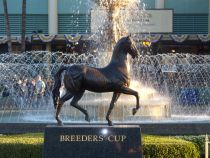Frequently Asked Questions?
What are the advantages of thoroughbred ownership through a partnership like Donnybrook Stables?
When you own a thoroughbred as part of a partnership, owning "part" of a horse means you only cover "part" of the expenses. If you decide to buy a 15% share in a Donnybrook Stables LLC, you own 15% of the horse. This means that you only cover 15% of the bills that pay the training and boarding. Likewise, you would earn 15% of any winnings the horse would earn at the racetrack. Horse ownership can be expensive as a sole owner, so partnerships really allow you to enjoy the same experience at a fraction of the cost.
What are the expenses that a partnership has to cover?
A racehorse in full training at a racetrack can cost anywhere between $40/day and $100/day depending on the circuit he/she races on. Donnybrook Stables tends to send its horses to trainers that have day rates somewhere in between. An average month at full race training rates for a Donnybrook Stables partnership is between $2200 and $2500.
When are expenses collected from the partners?
Typically, a partnership starts with some amount of money in "reserve". Our partnerships usually have 3 months of bills covered in the initial investment. Once the reserve runs out, cash calls occur quarterly. That way, partners are not asked to write a check on a monthly basis.
When does the partnership earn money?
The partnership earns money when the horse it owns finishes 1st, 2nd or 3rd in a race. There is a small amount of money earned for 4th and 5th place also, but it is minimal. These earnings will either be distributed to the partners or retained to pay future bills. The decision is up to the partners.
Can a partner attend the races when the horse runs?
Of course! Race day is a wonderful way to share the emotions that are running through you with your fellow partners. Partners will also get a chance to go the barn before the race to chat with the trainer and find out how the horse has been training leading up to the race. The feelings of the entire day are indescribable.
How is a horse selected at a sale?
Donnybrook's manager combs the auction catalogs to identify potential runners and then physically reviews each of them prior to the sale itself. Each step of the way is fully communicated to all partners, and partners are encouraged to participate at the sales to learn the process from start to purchase.
What do you look for in a horse from a yearling or 2-year-old-in-training sale?
Conformation first. Donnybrook always makes the ultimate decision at the sale based on the horse's conformation. A horse can be bred like a Kentucky Derby winner, but walks like an old plow horse. A well-conformed horse has the highest likelihood of making it to the races and competing…those are the runners Donnybrook looks for.
What is different about Donnybrook Stables?
Most partnerships are actually syndicates, where management buys a horse prior to investment, and then sells the horse to the partners at a significantly higher value. Donnybrook does not syndicate horses, but instead, brings all partners along for the entire experience, start to finish. Donnybrook Stables collects investments up-front, and then takes those funds to the sale. No secrets, no mark-ups, no fees.
Are there special tax implications to horse ownership?
Yes. Each partner is responsible to claim their share of earnings or losses in their personal taxes each year. Donnybrook Stables retains a personal tax accountant that can help with any questions a partner might have in terms of filing requirements.
Will partners stay updated on all their horses?
Absolutely. Once a horse is purchased, all partners will participate in regular dialogues about their future star, receive quarterly financial reports and monthly news letters on current happenings.
What types of partnerships does Donnybrook offer?
We offer 3 different types of partnerships. The cornerstone partnerships of Donnybrook are sales-ring partnerships purchasing primarily yearlings from the Kentucky and east coast sales. Also offered are private purchase and claiming partnerships based on partner interests.

